Readings Newsletter
Become a Readings Member to make your shopping experience even easier.
Sign in or sign up for free!
You’re not far away from qualifying for FREE standard shipping within Australia
You’ve qualified for FREE standard shipping within Australia
The cart is loading…






Pearl occupies a special place in the English canon. Together with Gawain and the Green Knight and two minor poems, the late fourteenth-century manuscript came to light after nearly 500 years of being tucked away in one private library or another. While Gawain (which may or may not be by the same hand) received early acclaim as a marvellously-written tale of magic and derring-do, Pearl has yet fully to gain the popularity it richly deserves. In terms of psychological discovery, theological debate, and an unmatched technical brilliance in the joint deployment of alliteration and rhyme, it is a thing of wonder. A dream-vision for almost its entire length, Pearl has a direct relation to the narrators real world. Whether or not the situation it depicts is a fictional one, the poem stands as a commemoration of the deepest personal experience. While the descriptive passages of a heaven-made world are remarkable, the exchange between a grieving man and the pearl he has lost and found pitched almost in terms of a quickfire argument is irresistible. A young female character, taking her time, demolishes a learned male opponent. Yet love speaks throughout, in a Christian presentation of the struggle to relinquish self-will, so that by the deftest of literary strokes the reader finally is one with the dreamer as he comes to terms with the beauty of what must be. This translation meticulously preserves a highly-demanding formal structure and lexical meaning while operating with a freedom which ideally, in this kind of poetry, is that of a conversational song. Dream-poems were not uncommon in the fourteenth century; and Pearl not only is a perfect example of the genre, but offers a poetic experience to reach beyond genre and time.
$9.00 standard shipping within Australia
FREE standard shipping within Australia for orders over $100.00
Express & International shipping calculated at checkout
Pearl occupies a special place in the English canon. Together with Gawain and the Green Knight and two minor poems, the late fourteenth-century manuscript came to light after nearly 500 years of being tucked away in one private library or another. While Gawain (which may or may not be by the same hand) received early acclaim as a marvellously-written tale of magic and derring-do, Pearl has yet fully to gain the popularity it richly deserves. In terms of psychological discovery, theological debate, and an unmatched technical brilliance in the joint deployment of alliteration and rhyme, it is a thing of wonder. A dream-vision for almost its entire length, Pearl has a direct relation to the narrators real world. Whether or not the situation it depicts is a fictional one, the poem stands as a commemoration of the deepest personal experience. While the descriptive passages of a heaven-made world are remarkable, the exchange between a grieving man and the pearl he has lost and found pitched almost in terms of a quickfire argument is irresistible. A young female character, taking her time, demolishes a learned male opponent. Yet love speaks throughout, in a Christian presentation of the struggle to relinquish self-will, so that by the deftest of literary strokes the reader finally is one with the dreamer as he comes to terms with the beauty of what must be. This translation meticulously preserves a highly-demanding formal structure and lexical meaning while operating with a freedom which ideally, in this kind of poetry, is that of a conversational song. Dream-poems were not uncommon in the fourteenth century; and Pearl not only is a perfect example of the genre, but offers a poetic experience to reach beyond genre and time.